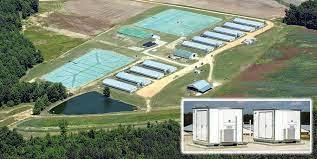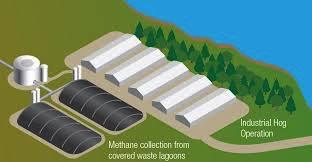 In a response to adverse civil judgments against Smithfield Foods the largest hog producer in North Carolina, the Company entered into an arrangement with Dominion Energy to capture methane from hog waste. The plan is to capture the potent greenhouse gas and to pipe methane elaborated in lagoons to a central facility to be refined into biogas. The liquid residue would be stored in secondary lagoons on the farm before application to pasture. Smithfield Foods claimed that methane from 19 farms would reduce carbon dioxide emissions by 160,000 tons annually and provide power for 4,500 homes.
In a response to adverse civil judgments against Smithfield Foods the largest hog producer in North Carolina, the Company entered into an arrangement with Dominion Energy to capture methane from hog waste. The plan is to capture the potent greenhouse gas and to pipe methane elaborated in lagoons to a central facility to be refined into biogas. The liquid residue would be stored in secondary lagoons on the farm before application to pasture. Smithfield Foods claimed that methane from 19 farms would reduce carbon dioxide emissions by 160,000 tons annually and provide power for 4,500 homes.
Civil-rights organizations believe that the methane capture plan does not address the environmental contamination and nuisance associated arising from waste from hog farms. Secondary lagoons will still release greenhouse gases and ammonia into the atmosphere and the problems of spraying liquid onto pastures has not been resolved.
 The Southern Environmental Law Center has filed a civil-rights complaint with the EPA on behalf of the Duplin County branch of the state NAACP and the North Carolina Poor People’s Campaign. A disproportionate number of minorities live within three miles of large hog operations.
The Southern Environmental Law Center has filed a civil-rights complaint with the EPA on behalf of the Duplin County branch of the state NAACP and the North Carolina Poor People’s Campaign. A disproportionate number of minorities live within three miles of large hog operations.
The EPA has accepted this civil-rights complaint for an investigation stating “the Agency has given significant priority to compliance with Title VI requirements with regard to permitting of animal waste.” On January 11th a State administrative law judge ruled in favor of the Department of Environmental Quality on the basis that existing water-protection laws in the State did not apply to animal operations recognized as providing significant economic and other benefits.
The issue of disposal of hog waste in North Carolina has implications for animal waste from dairy, broiler and egg operations nationwide. The outcome of litigation and action by regulatory agencies should be followed closely.